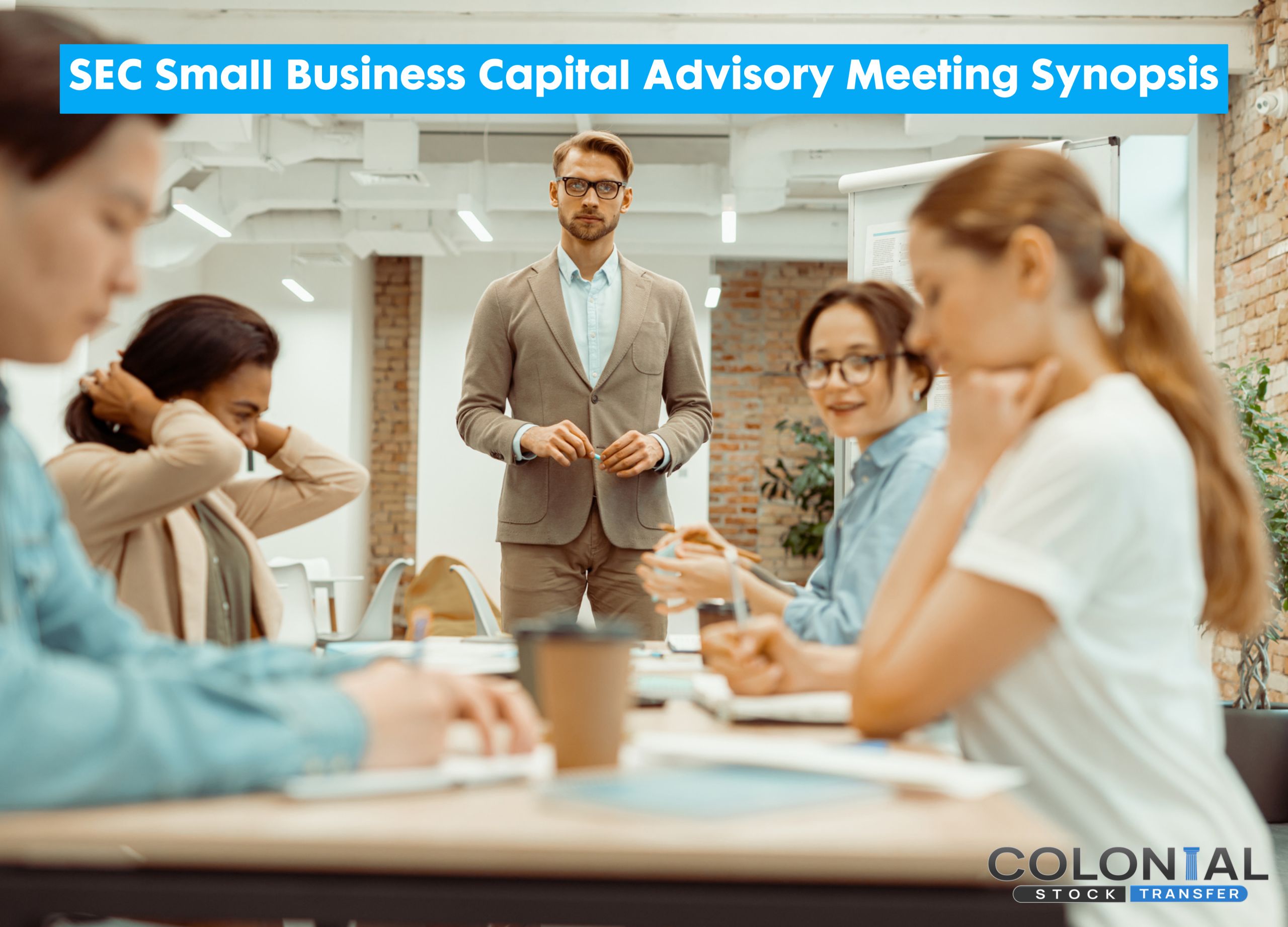
The Small Business Capital Advisory Committee held a meeting on February 2nd to discuss the Advocate for Small Business’s Capital Formation 2019 annual report, focusing on small business capital formation. The committee meeting was comprised of four panels; each of which had their own topic and key speakers.
Panel I: Overview of Annual Report from the SEC’s Office of the Advocate for Small Business Capital Formation
The first panel focused on OASB’s Capital Formation 2019 annual report. The OASB is an independant office created to advance the interests of small businesses and their investors at the SEC and in the capital markets. Jenny Reigel, Special Counsel, stated that the OASB will be implementing short and informational videos on their website to educate companies on securities and rulemakings. She also explained details of the report such as private placement offerings, IPOs, and other registered offerings. Lastly, she summarized the report to 5 highlights to be recognized by the committee;
- Harmonize the exempt offerings framework
- Increase investor participation in private offerings
- Engage investors via finders
- Put forward updates to crowdfunding rules
- Scale obligations for smaller, less complex reporting requirements for companies
Panel II: Exploration of Small Business Capital Markets Data and Challenges Faced by Small Businesses and their Investors
Senior Strategist and lead Venture analyst James Gelfer led the second panel discussion noting the overall growth of the industry, specifically size of seed deals. Gelfer distinguished that mega deals over $100 million have accounted for 250 transactions totalling $60 billion with financing occurring mostly in later stages. Gelfer pointed out the greatest deal driver geographically was the West Coast of the US. Specifically, there is more capital available in California than anywhere else. However, in his panel he also mentioned the need for more female and minority small businesses in this area. His panel highlights consisted of;
- The current growth in private equity and remarkable size of private companies
- The standings of the secondary market and direct listings considering the impact of “unicorns” last year
- Companies are raising less money while IPOs are increasing private shareholder numbers, enticing companies to stay private longer.
He concluded his panel by saying that venture capital is one of the riskiest asset classes, but there is very high variability for return. Gelfer pointed out that because it would be difficult for a one-off retail investor to invest at the local level, the committee needs to utilize a funds-to-funds vehicle for non accredited investors at the local level.
Panel III: SEC Office of Minority and Women Inclusion
Director of the Office of Minority and Women Inclusion, Pamela Gibbs highlighted the work of the department into 3 sections;
- Workforce Diversity
- Supplier Diversity
- Cross regulatory engagement
In these three categories, Gibbs described an increase of target outreach activity and contract use for OMWI business, acquiring data concerning diversity from other entities, and their implementation of effective diversity practice standards. She also mentioned that in efforts to continue educating minority and women owned businesses about capital raising rules, the office has decided to continue to partner with Miller.
Panel IV: Local Capital Availability for Early Stage Companies and the Role of Regional Funds
This panel consisted of those who conveyed their struggles of starting their businesses and those who are involved in regional funds and firms.
Patodia, discussed the small business she started and the challenges she had faced throughout the process. Her key conflicts were, not knowing how to attract proper funding and recognizing the need to attract investors based on investor and business model alignment and hiring a legal team.
Darnell Smith, Founder and CEO of Mojo stated the struggles that his business faced were early stage venture capital funding. His reasoning was his company is service based, which limited his potential investment opportunities for private markets and banks. Smith was also faced with the challenge of a minority and women owned business located in the MidWest.
Founder and managing director of KCRise Fund LLC, Darcy Howe, noted how her firm helps connects investors to regional companies and highlighted a few statistics;
- Up to 80% of all new jobs in Kansas City come from startups
- Her company funded 23 investments with 39 million through two central funds
- 76% of that funding came from outside of Kansas City
Meeting Overview
The group consensus was for the committee to focus on educating small funds and managers generate capital for their company, especially those dealing with geographical disparities. Other areas of focus were framework solicitation, unintended consequences regarding legislation and regulation, and the overall size of funds. In conclusion, the committee wrapped up the event by discussing the possible modification of the SEC’s 99-investor rule and the SEC’s amendments to the Volcker rule.
To simplify the process, small businesses can utilize Colonial’s SEC filing services.




